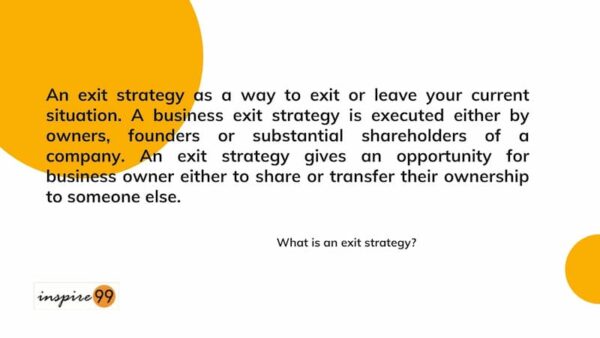Exit strategy: In this article, we will talk about the meaning and types of exit strategies. As an entrepreneur in early stages, an exit strategy was the last thing on my mind. However, my experience with fundraising has taught me that I’ll need to think about this as a part of my business plan. A business plan is a key indicator of your strategic directions of your startup. As an investor, I’d be interested to know how you’re thinking about the journey of your startup from idea to exit.
What is an Exit Strategy for Startup?

Exit Strategy Definition: An exit strategy as a way to exit or leave your current situation. A business exit strategy is executed either by owners, founders or substantial shareholders of a company. An exit strategy gives an opportunity for business owner either to share or transfer their ownership to someone else.
Normally these exit strategies take the shape of an entrepreneur or startup founder to sell their stakes in a company. If you look back the definition of a startup, we refer to the concept of scale. Ultimately, a startup founder makes their fortune in their exit strategies. The goal is to achieve a certain level of success upon which your business idea has shown market success. Ideally a company/individual buying you out has a strategy to expand this success further with or without your presence. Normally in these type of sell outs, you’ll not retain a controlling stake as the founder and are usually answerable to be the board etc.
Why should I as an Entrepreneur care about exit strategy?
This is a good question to ask. As an entrepreneur, the most inspiring factor is to see your idea flourish and turn the idea into a business. However, to develop and grow a business, you’ll need investment. You raise most of this investment via loans, self funding or private investors. Naturally this will come with strings attached
Why do investors invest their money?: Let’s face it – most startups are not philanthropic exercises. In fact, one of the main goals of a startup is growing to scale and expansion. As an investor, I’d be more interested in the returns for my risk. As an entrepreneur, unless you have an exit strategy, you’ll find it very hard to convince investors to part their money into your venture. Make sure that this exit strategy is a part of your business plan even though you may not have all the necessary details.
Types of Exit Strategies
What are the different types of exit strategies you can think of as an entrepreneur? There are typically three types of exit strategies – initial public offerings (IPO), strategic acquisitions, and management buyouts (MBO)
IPO – Initial Public Offering
If you follow the stock market, you’d already be aware of companies announcing availability of shares. Mature companies already have shares to purchase. An IPO however refers to the stage when you decide to make your company public. This is essentially an invitation to the general public to invest in your company and purchase a small part of ownership in this company. This is one of the best ways to retain your ownership of the company and control the % of shares that you wish to make available for the public. However, this type of exit depends on your popularity and the amount of money you want to raise from this.
Mergers and Acquisition
You might have heard of mergers and acquisitions. This is relatively easier compared to an IPO that demands more bureaucratic processes from business owners. An acquisition generally takes away your controlling stake. Sometimes this can also happen as a part of merger into a larger company. Good thing about a mergers and acquisition is that although you won’t have the controlling stake, you can still continue with the business as an employee.
Management Buyout
As your business grows, so does the management team responsible for running a business. A standard startup journey gives shares to its fellow employees, management team etc. A management buyout is a situation when the management/key employees, shareholders decide to buy you out. They may raise funds for this buyout via internal resources or even loans depending on the situation. A Management buyout can happen to oust you out of a business or can be helpful at a stage where you might want to retire from the business.
Most often, business plans choose either IPO or Mergers are acquisitions as route of exit. I can’t see the investors viewing a Management buyout in the business plan very kindly.

Pingback: 5 Scalable startup entrepreneurship characteristics - Inspire99
Pingback: 5 Stages of Startup from idea to Exit for an Entrepreneur - Inspire99